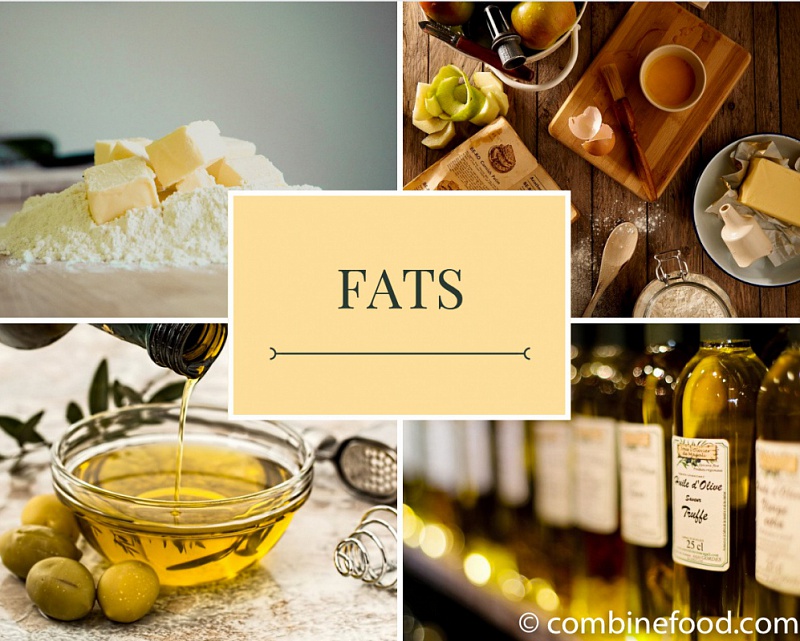
The main and most obvious function of fats is the energetic one. When oxidized 1 gram of fat produces 9.3 kcal of heat. Moreover, fats form a part of cell membranes. They also regulate some metabolic processes (in particular, synthesis of a number of hormones). A subcutaneous fat layer helps in maintaining our internal temperature, keeping the body from overcooling.
Animal fats contained in meat and dairy products are called saturated (they contain more than 50% of saturated fatty acids). At room temperature they are in a solid state. The dairy fats are the ones that digest the best from all the saturated fats. The one that digest the worst is mutton fat.
Unsaturated fats become liquid at room temperature. Among those fats are all vegetable oils, fish oil (fishes live in cold water and saturated fats would freeze in cold temperature). Edible unsaturated fats digest quite well, but their influence on our organism can be contradictory. We will talk about this in more detail later.
There also artificial fats – margarine and cooking fats. In the best case they are made of vegetable oil using hydrogenation reaction (when hydrogen under pressure is going through hot oil mixture and nickel catalyst). If you care about your health, it is better to avoid buying those products. In the process of digestion fats first decompose to their basic compounds – glycerin and fatty acids. Then while being in the intestinal walls they are used for synthesizing fats that are “native” for the human body and those fats are delivered to the blood.
The amount of fat in the blood can vary significantly. Normally by the next meal almost all fat obtained from the previous one should have already left the blood flow either by being burnt or turned into fat. If we eat too often, especially food that contains a lot of oil or butter, we do not allow enough time for that process to take place. As a result, the fat particles glues erythrocytes and blocks capillaries, the excess of cholesterol leads to plaques formation and the metabolism in general is disturbed.
Our organism can produce its own saturated fats from proteins and carbohydrates. Just a small amount of unsaturated fats is really necessary for building cell membranes and satisfying other needs of our bodies (1 table spoon of butter or vegetable oil per day is enough). This minimum amount can also be received from vegetable food (cereals, nuts, seeds), without consuming oil or butter, raw vegans can serve as a good example of that.
Although one can live without oil and butter, yogis do not forbid moderate consumption of such products, and for people who do not practice yoga they even allow consumption of animal fat, fatty meats etc. At the same time, consuming too much fat will not do any good and the same is true for proteins and carbohydrates as well. Of course overweight people should be careful when eating fatty food. Thin people have more freedom in this respect. It is impossible to set some defined norms regarding this matter.
During winter people need more fats, during summer less. And it also changes a lot depending on if a person is going to do some hard physical work after lunch or just sit at his office table. The norms for fat consumption also depend on age a lot. Different people have different needs.
In general, young, healthy and active people can follow the norms set out by the Institute of Nutrition that are 80-100 grams of fat per day, including fat in meat, cheese, milk etc. Older or less active people should try to reduce daily consumption of fat to 20-30 grams.
Now let’s talk about vegetable oils. Until recently people widely believed that vegetable oils were undoubtedly better than animal fats, proving this by the fact of its easy digestion and effect on cholesterol metabolism. However, in the diet of long-living inhabitants of Caucasus, Ecuador and Hunza, i.e. people with the longest average life duration, there is almost no vegetable oil! Classic yoga writings, for example the Hatha Yoga Pradipika and others, advise people practicing yoga not to consume vegetable oils. Observations show that for some people vegetable oil causes serious liver overload and organism intoxication that can be quite dangerous. For others, on the contrary, vegetable oils have positive effects.
For this reason, we can recommend our readers to conduct an experiment. Do not eat vegetable oils for 5 days, then consume just it for 5-6 days and then compare the way you are feeling. If you did not feel a big difference, then both oils digest well in your body and you should just avoid mixing butter and vegetable oils in the same meal.
And there are some more remarks. Normal butter can be substituted by the clarified one, as its digested better and does not contain any harmful additives. It was also noticed that butter in oatmeal and on a piece of bread behaves differently. The mixture of bread and butter often causes a lot of trouble for digestive organs, especially liver and intestine, but when it is mixed with porridge or vegetables it is digested relatively easy. The worst dairy fats for digestion are sour cream and heavy cream. When consumed often and in big quantities, especially with potatoes, cereals and bread, it can cause lipid metabolic disorders, what can be noticed by the appearing of new black- and whiteheads on skin. With time, the liver and gall bladder also can be damaged. A general “norm” for sour cream consumption that will not cause any negative consequences is 30-50 grams per day.
Text: from the book of A Eddar "The treatise of nutrition".


 en
en  ru
ru 
















Combinefood
Your comment has been sent for moderation!
Next